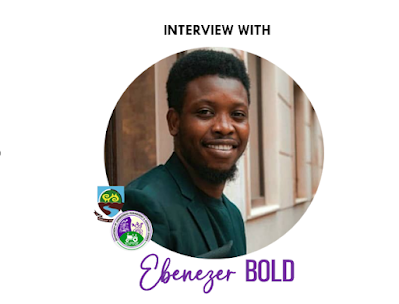ALUMNI INTERVIEW WITH EUGENE ADU-GYAMFI

A brief introduction about yourself
I'm Eugene Adu-Gyamfi, an Agribusiness graduate from the class of 2022. In 2021, I served as the Public Relations Officer for the Agribusiness Department, and in 2022, I took on the role of Public Relations Officer for the Student Representative Council (SRC)
What is your current position, years of experience, and employer? What did you find out about your job, and what has your career path been like?
I am a Microfinance Officer at Amenfiman Rural Bank, the leading rural bank in Ghana, with one year of experience in this role. My journey to securing this position began with a mandatory attachment at the institution, where I maintained close contact and built strong relationships. Although I initially hoped to complete my national service there, circumstances led me to the Ghana Audit Service instead.
Despite this, I remained proactive in my job search, submitting my CV to the HR department at Amenfiman in case of future vacancies. Throughout my national service, I applied for numerous jobs and attended multiple interviews, which helped me refine my confidence and interview skills. The constant question—"After school, what’s next?"—stayed on my mind until one day, Amenfiman reached out with an opportunity for an exam and interview. Determined to make the most of it, I prepared thoroughly, gave my best effort, and was ultimately selected.
Regarding my career path, it has been fulfilling so far. However, I always strive for more, which is why continuous learning and skill development are essential to remaining relevant in the industry
How did your experience at UENR, particularly in the Department of Agribusiness Management & Consumer Studies (DAMCS) help you find your first position after graduation?
The rigorous training under Professor Bannor often made you feel like you hadn’t quite arrived, but in hindsight, it was invaluable. After stepping into the industry, the key lessons I took from him were grit, resilience, and the ability to handle pressure.
I vividly remember his thought-provoking question: What skills do you possess that would make a company hire you and justify the salary you demand? That single question was a wake-up call—it highlighted the importance of acquiring additional skills beyond academic qualifications. After all, many people hold certificates, but standing out requires something more.
What skills or knowledge did you learn throughout the program that you found most useful in your career?
Developing communication skills through presentations and mastering Excel for stock preparation have been valuable additions to my skill set.
On a typical day in this job, what do you do?
A typical day involves visiting customers to engage with them, assessing their financial needs, and determining if they require support. Afterward, I return to the office to process loan applications before heading out again for daily collections.
What training, education, licenses, or prior experience are essential?
Your interests will ultimately guide your path, but based on my own experience, I strongly encourage everyone to pursue IT training and certifications. I recently graduated as a cybersecurity professional specializing in Governance, Risk, and Compliance / IT Audit, and I’ve seen firsthand how valuable this expertise is in the banking sector.
Before entering the bank, I had completed a Data Analytics program, which I applied in voluntary work—an experience that proved instrumental in shaping my career.
What do employers look for in new graduates, especially in your field?
Employers seek candidates who have gone beyond the basics, adding valuable skills that set them apart. Since many applicants meet the basic qualifications for a job, it’s up to you to develop expertise that makes you unique.
Your past work experience also plays a crucial role. While some may feel they lack experience, even selling pure water on the street contributes to your professional growth—it helps build communication skills through customer interactions. The key is to present such experiences effectively in your CV. Additionally, it's important to tailor your CV to match each job application, ensuring it highlights the most relevant skills and experiences.
What are the career opportunities/advancement that one can expect in the area of your career interest? If so, what must you do for a promotion?
Opportunities abound, but being in the right place at the right time often comes with God’s favor and grace. To thrive in the industry, continuous self-development is essential—you must invest in learning, acquiring new skills, and adapting to stay ahead.
What special advice would you give a person entering this field?
Avoid rushing into competition in the industry. You may find yourself alongside someone earning three times your salary, but as a newcomer, trying to compete directly can be counterproductive. Success comes with time, so focus on growth, skill-building, and advancing through the right channels to reach the top.
If you could go back in time and start the program all over again, what advice would you give yourself as an incoming BSc Agribusiness student?
I would have invested in gaining more knowledge earlier to ensure long-term relevance. It’s crucial to seize every opportunity that comes your way and make the most of it.
Do you have any general fond memories in the Department you'd like to share?
I still recall Professor Bannor’s lectures—his ability to engage everyone was remarkable. He would seamlessly insert a joke, making the class laugh, and before you knew it, he had directed a question your way, ensuring that everyone participated.


